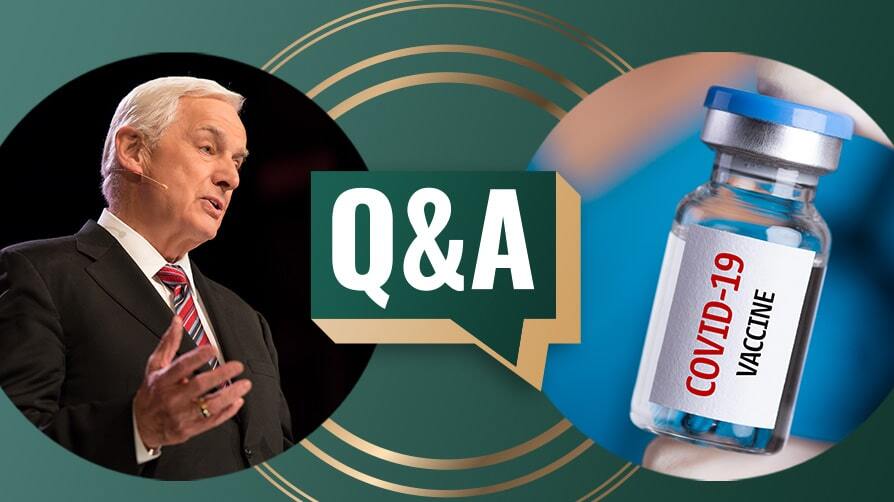I need help

Your response has been received, and we will be praying for you.
Look for answers to some of the most common questions in the weeks ahead.
Suppose you made a million dollars per year. Would that set you up for life? Would it give you financial security for the future? Well, apparently not if you’re a professional athlete. According to a report in Investment News, 78 percent of NFL players are bankrupt or under financial stress within two years of retirement. Sports Illustrated similarly reports that 60 percent of NBA players are in serious financial trouble within five years of retirement.1
Knowing what some professional athletes make, we’re astounded to learn that many of them will end up struggling to pay their bills within a few years of their last game. How can that be? The two biggest culprits, according to the reports, are divorces and joblessness.2 Many former athletes also cite the social pressures of trying to sustain a luxurious lifestyle. Others fall prey to friends and family members wanting them to invest in unwise ventures. And then there are the crooks. John Elway invested millions of dollars with a hedge fund manager who, as it turned out, was running a Ponzi scheme.
It’s not enough to have a job that simply takes care of today’s needs.
It’s not enough to have a job that simply takes care of today’s needs. Somehow we need to manage wisely for the future. King Solomon drew a lesson from the lowly ant, “which, having no captain, overseer or ruler, provides her supplies in the summer, and gathers her food in the harvest” (Proverbs 6:6–8).
In ancient Egypt, Joseph wisely stored up grain for the coming days of famine. In Proverbs 31, the wise woman was a hard–working manager who provided for her family and wasn’t worried about winter. She prepared for the coming seasons in advance. Jesus commended the shrewd steward in Luke 16 for using his current position to ensure a secure future.
{ms_advert_2_box}Nothing Can Pry Us From His Hand
Many of today’s companies offer retirement, investment, and insurance benefits that help ease our minds regarding the future. One insurance company even uses two upturned palms to assure us that we’re in good hands when we’re in their care. Yet we know by hard reality there’s not much security in our world or its economy. We don’t know what a day will bring forth. Riches can disappear in a moment. Jobs vanish. Savings and investments can turn sour. Stocks decline. Economies crash. As Proverbs 27:24 says, “Riches are not forever, nor does a crown endure to all generations.”
As Christians, we don’t depend on the world for ultimate security.
As Christians, we don’t depend on the world for ultimate security. For us, the eternal God is our refuge, and underneath are the everlasting arms. We have a hope that endures, for when Jesus comes into our lives, He comes with abiding security. He not only died to forgive our sins; He rose from the dead to give us eternal life. His resurrection supplies the power, provision, and pattern for our own resurrections. Because He lives, we will live also.
John’s Gospel drives this home. At the end of his Gospel, John stated his purpose in writing it—that we might believe in Christ and have eternal life (John 20:31). He similarly ended his little letter of 1 John by telling us he had written it that we might know we have eternal life (1 John 5:13). Throughout his writing, John used the phrases “eternal life” and “everlasting life” 23 times. For example, Jesus told us in John 10:26–29: “My sheep hear My voice, and I know them, and they follow Me. And I give them eternal life, and they shall never perish; neither shall anyone snatch them out of My hand. My Father, who has given them to Me, is greater than all; and no one is able to snatch them out of My Father’s hand.”
The future just doesn’t get any more secure than that!
Nothing Can Separate Us From His Love
Not only can nothing snatch us from His hand; nothing can separate us from His love. The apostle Paul declared: “Who shall separate us from the love of Christ? Shall tribulation, or distress, or persecution, or famine, or nakedness, or peril, or sword?” He went on to say, “I am persuaded that neither death nor life, nor angels nor principalities nor powers, nor things present nor things to come, nor height nor depth, nor any other created thing, shall be able to separate us from the love of God which is in Christ Jesus our Lord” (Romans 8:35, 38–39).
Bill Bright, founder of Campus Crusade for Christ International, observed, “My experience in counseling thousands of students and laymen through the years since I met Christ personally has convinced me that there are literally tens of thousands of good, faithful church–goers who have received Christ in prayer, but who are not sure of their salvation.”3
How different the attitude of the apostle Paul! He exclaimed, “I know whom I have believed and am persuaded that He is able to keep what I have committed to Him until that Day” (2 Timothy 1:12). He had a hope that infused his days with optimism. There weren’t any insecurities with Paul, even when he was facing execution. He was convinced. He knew. He was persuaded. And no one could tell him otherwise.
Nothing Can Alter His Plan
The Bible also teaches that nothing can alter God’s plan. Ecclesiastes 3:14 says, “I know that whatever God does, it shall be forever. Nothing can be added to it, and nothing can be taken from it. God does it, that men should fear before Him.”
Our Lord is the same yesterday, today, and forever. He is immutable—unchanged, unchanging, and unchangeable. His grace doesn’t fluctuate. His power doesn’t ebb and flow. His love and mercy don’t rise and fall with the tides of any cosmic ocean. He is steadfast, constant, and enduring. The Bible says, “The Lord is good; His mercy is everlasting; and His truth endures to all generations” (Psalm 100:5).
Our Lord is steadfast, constant, and enduring.
What security and hope! What a basis for an optimistic attitude, even during painful times. And how wonderful to know we don’t have to fear the future or worry about our security.
In his book, How to Begin the Christian Life, George Sweeting suggests that doubting our salvation is like a prisoner who has been pardoned by the governor. A guard brings him the document, and there it is, signed and sealed. Suppose you ask the man, “Have you been pardoned?” he will say, “Yes.”
“Do you feel pardoned?” we ask.
“No, I don’t. It’s all so sudden.”
“But if you don’t feel pardoned, how do you know you are pardoned?”
“Oh,” the man replies, “it tells me so right here.”4
The Bible does not use vague or nonspecific language regarding our salvation.
The Bible does not use vague or nonspecific language regarding our salvation. It doesn’t use terms like maybe or might or hope–to–be. It says will and shall and is. If you struggle with knowing for certain that you’re going to heaven, you can ARM yourself with assurance in three ways, using the acronym ARM:
A = Ask yourself: Have I sincerely asked Jesus Christ to forgive my sins? Am I trusting His blood for eternal salvation? Have I received Him as my personal Savior and Lord? If not, it’s essential to do so today, for today is the day of salvation.
R = Realize that doubting your salvation is questioning God’s faithfulness to His promises. Lewis Sperry Chafer wrote, “When God has made an unconditional declaration of His faithfulness, it is hardly becoming in one of His children to entertain any uncertainty in those things which He has promised.”
M = Memorize one of the verses cited in this article, meditate on it whenever you are fearful, and rest in the promises of God’s Word.
Nothing can separate us from His love. No one can snatch us from His hand. Nothing can alter His plan. We’re as secure as secure can be, as hopeful as the brightest promises of God, and as blessed as the richest soul.
Let’s start enjoying our eternal life today!
This article originally appeared in the May 2011 issue of Turning Points devotional magazine.
Sources:
1Paul Wachter, “Pro Athletes, Amateur Money Managers,” Bloomberg Businessweek, October 7, 2010, accessed on January 19, 2011.
2Davis D. Janowski, “Scouting Report: Finding Pro Athletes,” Investment News, January 16, 2011, at <http://www.investmentnews.com/article/20110116/REG/301169985>, accessed January 19, 2011.
3Bill Bright, How To Be Sure You Are a Christian (Campus Crusade for Christ, 1972), 5.
4Adapted from George Sweeting, How to Begin the Christian Life (Chicago: Moody Press, 1970), 106. Sweeting’s version is a close rendering to a similar passage in R. A. Torrey’s How to Succeed in the Christian Life (Chicago: Moody Press, u.d.), 24.
{ms_advert_5_row}Global hope is in trouble, and many people operate on the basis of their own “can do” spirit. But when we’re battered by storms, everything depends on the strength of our anchor.
The world anchors its hope in money, success, prestige, education, nationalism, health advances, and positive thinking. Sooner or later, those lines break, and we’re spun around in the waves and capsized. Take the legendary band, The Beach Boys. Despite its runaway success, the group has been haunted by what some commentators call the “curse of the surf.” Of the three Wilson brothers who started the band in 1961, two of them, Carl and Dennis, died young. Dennis dove into the water at a marina and drowned while under the influence of alcohol. Carl died of cancer. The third brother, Brian, ruined his life with drugs. When co–founder Mike Love was asked what single thing had most impacted The Beach Boys, he replied, “Drugs.”1
Our global hope and our personal hope depend on being anchored to Jesus Christ.
Everyone wants to be a celebrity, but few of us consider how fame magnifies all the problems and stresses of life. Read a Who’s Who of the rich and powerful, and you’ll find endless stories of self–destruction, tragedy, early deaths, and broken hearts. Whether we’re well–known or unknown, our lives need a solid anchor. Our global hope and our personal hope depend on being anchored to Jesus Christ.
{ms_advert_3_box}The Anchor Keeps Us From Fearing the Future
That’s the message of the book of Hebrews, which was addressed to a group of Jewish Christians facing renewed pressure and persecution. These believers were discouraged. They were weary of the battle, and some of them wondered if they would survive the storm. According to Hebrews 10:32–36, they were afraid of the coming days.
The writer of Hebrews didn’t merely give them uplifting quotes or inspirational comments. He pulled them into the heart of the Old Testament and told them how God had given Abraham a promise in Genesis 12 and confirmed it with an oath in Genesis 15, “that by two immutable things, in which it is impossible for God to lie, we might have strong consolation, who have fled for refuge to lay hold of the hope set before us” (Hebrews 6:18).
The passage continues: “This hope we have as an anchor of the soul, both sure and steadfast, and which enters the Presence behind the veil, where the forerunner has entered for us, even Jesus …” (verses 19–20).
Anchors have been a symbol of the Christian faith from the very beginning of Church history.
Anchors have been a symbol of the Christian faith from the very beginning of Church history. Many ancient Christian catacombs and cemeteries are filled with depictions of anchors. In his album, Soul Anchor, Michael Card observed, “The first century symbol wasn’t the cross; it was the anchor. If I’m a first century Christian and I’m hiding in the catacombs and three of my best friends have just been thrown to the lions or burned at the stake, or crucified and set ablaze as torches at one of Nero’s garden parties, the symbol that most encourages me in my faith is the anchor. When I see it, I’m reminded that Jesus is my anchor.”
We can face the future with confidence when we’re anchored to the Rock.
The Anchor Keeps Us From Drifting With the Tides
If Jesus is your anchor, He will also keep you from drifting with the tides. Life is never still, just as the sea is never silent. Even without storm warnings, the currents of our culture are always moving. The undertow of temptation is just below the surface. But a solid relationship with the Lord Jesus—a commitment to Him as Lord and Savior—will steady the ship and keep us from drifting.
Think again of the image drawn from Hebrews 6. Use your imagination. Picture your life as a ship on the seas of life. You’re standing on the deck with an anchor at your feet. A cable rests in your hands, and you’re ready to cast anchor. Instead of dropping it into the ocean, see yourself swinging it around as you aim it upwards. Let go. Watch it fly through the sky, enter the heavenly tabernacle of God, and attach itself to the Solid Rock in the most holy place behind the veil.
That’s the picture the Bible paints for us, and when I close my eyes and think of it, I realize afresh the greatness of my stability in Christ. The winds may blow, the tides may rise and fall, the currents of culture may pull at me. But I have an anchor that keeps my soul steadfast and sure, even amid the tides of temptation and currents of concern. And so do you.
The Anchor Keeps Us From Capsizing in the Storms
Anchors also keep us from capsizing in the storms. In her book You Are Not Alone, Dena Yohe describes the pain and panic she endured as her daughter lapsed in and out of crises. Dena finally made a discovery. “The most important thing about my life wasn’t how my children were doing (as important as that was) but my relationship with Jesus, my Savior…. When I chose to focus on Christ, my real hope, firm hope, was revealed.”
Using a similar illustration as that in Hebrews 6, Dena continued, “Our challenge is to loosen our grip on the fragile hopes we’ve been setting our hearts on. They’re slippery and elusive. They slip through our fingers like sand…. Hope is the rope thrown to us by almighty God, who fastens it tightly around our waists to keep us from falling into a pit of despair…. Please take hold of this new kind of hope.”2
But we have an anchor that grips all the promises in the Bible, and our risen Lord guarantees those promises.
You may be in stormy weather. You may be cast down because of ominous medical reports or an angry neighbor. Maybe there’s a divisive problem in your family or church. We don’t always know how things will work out in the short run, so we can’t base our hopes on immediate gratification. But we have an anchor that grips all the promises in the Bible, and our risen Lord guarantees those promises. He alone can keep us from capsizing in the storm.
Only Jesus can provide global hope. He’s the only hope for our world. And He’s our personal hope. He’s our firm foundation. The circumstances of this life cannot toss us to and fro if we’re anchored to Christ. Let Him steady your physical, emotional, intellectual, and spiritual life. Let Him keep you steady, for, as an old hymn says:
We have an anchor that keeps the soul
Steadfast and sure while the billows roll.
Fastened to the Rock, which cannot move,
Grounded firm and deep in the Savior’s love.3
This article originally appeared in the January 2017 issue of Turning Points devotional magazine.
Sources:
1Tiana Kennell, “The Beach Boys’ Mike Love opens up about career and life,” The Shreveport Times, March 12, 2015, www.shreveporttimes.com/story/entertainment/arts/2015/03/11/beach–boys–mike–love–opens–career–life/70161422/
2Dena Yohe, You Are Not Alone (New York: WaterBrook, 2016), 141–142.
3Priscilla J. Owens, “We Have an Anchor,” published in 1882.
{ms_advert_6_row}














